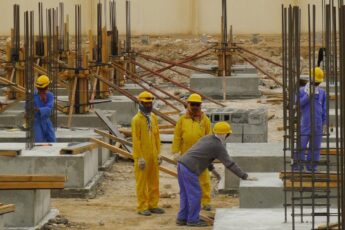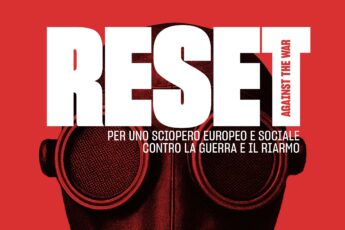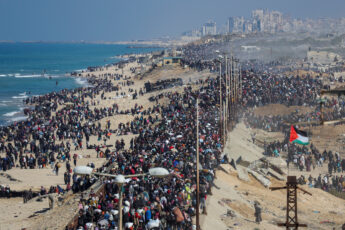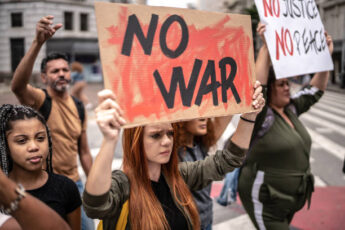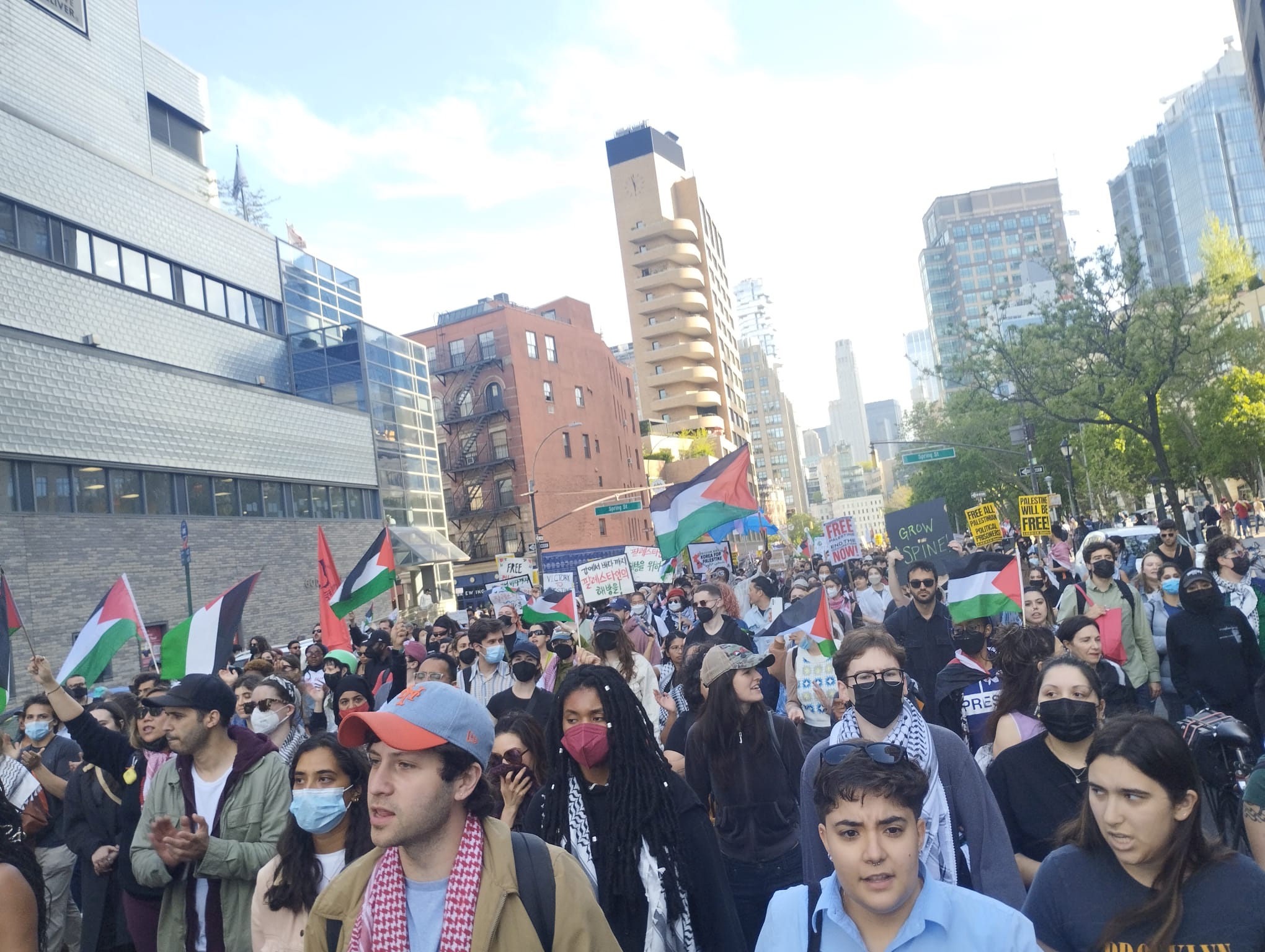
We publish an interview with Aaron, an organizer and Ph.D. candidate at the New School for Social Research. The interview was realized on May Day during a big demonstration that saw 10.000 workers, students and activists taking to the streets against genocide in Gaza and against the repression of student protests in the United States. The day before the interview, on April 30th, the encampments at Columbia and at CUNY had been dismantled by the police, while in the following days several other encampments faced brutal police interventions throughout the United States. In the early morning of May 3rd, the same happened to the encampments at the New School and at NYU. Meanwhile, in Los Angeles, the student encampment at UCLA was violently attacked by a pro-Israeli mob, with the police refusing to intervene. Overall, in the past two weeks, while the Israeli government is moving forward in its attack on Rafah, in the United States more than two thousands students have been arrested for daring to raise their voice against their government’s continued support for the massacre of Palestinians. Nonetheless, encampments are spreading to Canada, France and the United Kingdom. In the interview, Aaron tells us about the situation at the New School and about the role of the UAW within the protests, reflecting on the challenges that the student movement for Gaza faces in the wake of the current police repression. In this respect, he argues for the need of a greater communication and connection among encampments and among student collectives both at the city and at the national level. As a matter of fact, if protests will remain isolated from one another, the risk is that they will continue to be locally suppressed. In the face of a coordinated repressive response by the state (and by the Democratic Party in particular) at all levels, it is only through an increasing coordination in demands, discourse and actions within and beyond the United States, that the student protests can continue to expand and to challenge war, militarization and genocide.
TSS: Can you tell us something about how you became involved in the protests against genocide in Gaza at the New School?
Aaron: I’m a doctoral candidate in philosophy at the New School, and I’m also an organizer with our student worker union SENS (Student Employees at the New School), part of the UAW. I’ve been continuously organizing at the New School on a variety of different fronts for seven years at this point. After the president of Columbia Shafik called the cops, it became really clear to me that we needed to do something, that we needed a large scale citywide mobilization. I’ve been on the side of Palestinian liberation for quite a long time and I’ve been active to varying degrees in New-York based solidarity demonstrations. This is a huge and unprecedented moment in relationship to this struggle in the United States. It’s massive, it’s a huge transformation. On that Thursday night, April 18th, when they called the cops at Columbia, I felt the thing, like, that I had to do politics now.
TSS: What’s the situation at the New School now? We know you set an encampment there. How did the university respond?
Aaron: The university has responded in a very different way than a lot of the other administrations. And I think in part that’s reflective of a lot of solidarity organizing, which has mostly been labor centric but not exclusive. That’s occurred over the last several years. Since 2020, there was a firing of a bunch of staff members that started to build connections across workers throughout the university. That intensified quite a bit in 2022 with the part-time faculty strike, which increased these connections. At the same time, full-time faculty started to organize a chapter of the American Association of University Professors, which is not a union but a representation organization. I think that because of this, the administration has learned that when they do things that are against the values of the community, they’re punished consistently. So now, for the last several years we’ve ousted multiple presidents. I think at one level, we have an organizing from below putting a lot of pressure to on the administration not to follow suit. And I also think that our current president is a much savvier political actor who understands that this is probably going to backfire on her. And she decided to play a different strategy. My understanding of what she’s doing is she thinks the semester is going to end, and almost always in student in university politics, when the semester ends, things fizzle out. And so rather than trying to escalate from their side, they’ve tried to wait things out.
TSS: Who’s participating to the protest? Are professors and staffers participating together with students?
Aaron: Yes, you know, basically workers and students from across every aspect of the university who’ve been previously organizing for Palestinian liberation and also for labor have come together. And a ton of new people have joined in as well. So, we’re bringing in a lot of new people and developing a lot of new organizers in this process, which is amazing. That’s great.
TSS: We saw the police dismantling of encampments at Columbia and at CUNY yesterday night (April 30th), with a lot of students arrested. Where does this protest move from here, in your opinion? How can the students continue to expand and continue the protest?
Aaron: I’ve been advocating for two things. One of them, is tactically understanding our encampment in relationship to a process of bargaining with the New School board of trustees, who control the university’s finances, to obtain divestment. Divestment is basically the unifying demand of all of the private universities across the country. The other thing that I think we ought to be doing is creating a more national level of coordination, so that we’re pursuing a similar kind of strategy, because that seemed to be working. There are a handful of universities that are moving towards divestment now. After this, I think that we need to unify the encampments, produce a large scale political statement which calls for divestment at the universities and threatens non-voting in in the next elections.
TSS: Following up on this, the students’ protests were met with a very repressive response, not only by the Republican Party, not only by university administrations, but also by the Democratic Party. What do you think could be the consequences of these protests on a political level?
Aaron: Right now there’s no crack in the Democratic Party. They’re completely in support of a repressive responses in relationship to these protests. If that is allowed to pass, if we don’t stand up now and start to deeply emphasize anti-repression politics, the next decade in the United States is going to be terrible. Whether we get Biden or we get Trump. This is going to be a continuous pattern. It’s been clear that there’s been rising waves of dissent over the last decade, and particularly at the universities. The administrations have been looking for an opportunity to reverse old precedents which would stop them from using more repressive tactics against students. And I think that Shafik the others thought that Palestine is a divisive enough issue that they’re going to have enough cover, that they can break that precedent without consequences. But once the precedent is broken, it’s bad for every single social movement. So I think even people who are not so invested in the Palestine liberation struggle or not so invested in antiwar politics, but who care about any social movement in this country need to be strongly united right now against repression.
TSS: Looking at the protests from a broader perspective, to what extent you think these protests are succeeding in connecting the struggle for Palestine and against genocide to a broader critique of U.S. society, to a critique of racism, of militarization and to the functioning of universities in the United States?.
Aaron: From what I’ve seen, I think they’ve been extremely successful. That is owed to the seriousness of long-time Palestinian liberation organizers in this country who for various contingencies of political history have been pushed into a theoretical analyses that are, you might say, intersectional, but otherwise sort of unifying theoretical analyses. And that has been the tone and tenor of the political education that’s been occurring, at least in New York City. And I would imagine, you know, nationwide. I also think that we’re seeing these protests in this scale and with the level of militancy that we’re seeing it as a direct response to the fact that many of the students who are currently in university were active already in 2020, in the wave of protests after the murder of George Floyd. I think those protests had a massive impact. That moment taught people a lot of things about how to do politics strategically, and it also taught them the most important lesson, which is that the cops are not your friends, which is hard for Americans to learn.
TSS: Since you are a union organizer and we are currently at a May Day demonstration that tries to unite students and workers, can you tell us what was the role of the UAW in these protests? Do you think that there might be a connection between the students protests and the resurface of labor struggles that we’ve been witnessing in the United States in the past years?
Aaron: I think labor unions were some of the first larger scale civil society organizations to push for ceasefire. The UAW was the first large scale union to do so. And that was a direct result of rank and file mobilization within our union. Of course, right now, we’re in a moment where our official national leadership is continuing to endorse Joe Biden, but I think the next step will be a lot of rank and file pressure to retract that endorsement. In general, we’re in a massive strike wave within higher education, and that’s affecting students. Students are acting in solidarity with their instructors or with themselves as student workers in really unprecedented ways. I mean, we saw this in public universities. We’ve seen it in private universities. People are aware of the fact that U.S. militarism and decreasing standards of living and welfare in this country are connected to the attacks on higher education.
TSS: Can you tell us more about the workers’ pressure from below that allowed to produce changes in how the UAW functions as a union?
Aaron: There was a reform movement called the Exodus, which started in the university system. They met and conjoined with tendencies in the auto companies, who had been dissatisfied for quite a long time with how the union worked. Together they formed the UAWD, the United Auto Workers for Democracy. First of all, we pushed for “one member, one vote” so that we could actually have a real say in who the leadership was. And then we organized a slate, and we just barely won enough seats to have control, basically, of the union. That doesn’t mean there aren’t still problems. It doesn’t mean that we have a unified politics across the caucus. But you know, so far the consequences of that victory have been massive. We increased strike pay, the level of support for organizing-minded campaigns. More broadly, we changed the tone of the messages we get from the top, we forced the leadership to ask for more, to strike harder, to push harder instead of asking for nothing, which is what it used to be. So it’s been a huge change.


